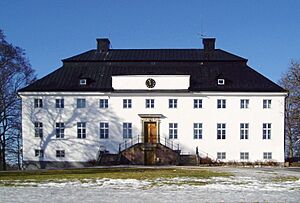Arvid Horn facts for kids
Quick facts for kids
Count Arvid Horn
|
|
|---|---|

Portrait by Lorens Pasch the Elder
|
|
| President of Privy Council Chancellery of Sweden | |
| In office 1710–1719 |
|
| Preceded by | Nils Gyldenstolpe |
| Succeeded by | Gustaf Cronhielm |
| President of Privy Council Chancellery of Sweden | |
| In office 1720–1738 |
|
| Preceded by | Gustaf Cronhielm |
| Succeeded by | Carl Gyllenborg |
| Personal details | |
| Born | 6 April 1664 Vuorentaka Manor in Halikko, Finland |
| Died | 18 April 1742 (aged 78) Ekebyholm Manor, Norrtälje, Sweden |
| Political party | Caps (mössorna) |
| Spouses | Anna Beata Ehrensteen (married 1696) Inga Törnflycht (married 1705) Margareta Gyllenstierna (married 1711) |
| Military service | |
| Allegiance | Sweden |
| Rank | Lieutenant General |
| Battles/wars | Great Northern War |
Arvid Bernhard Horn (born April 6, 1664 – died April 18, 1742) was an important Swedish general, diplomat, and politician. He was part of the noble Horn family. He led the Swedish government twice as the President of the Privy Council Chancellery. This was from 1710 to 1719 and again from 1720 to 1738. He was a key leader during a time in Sweden called the Age of Liberty.
Contents
Early Life and Military Career
Arvid Bernhard Horn was born in Finland, at Vuorentaka Manor in Halikko. His parents were Gustaf Horn af Kanckas and Anna Helena von Gertten. After finishing his studies at the Royal Academy of Turku, he joined the Swedish Army.
He served as a soldier in different countries for several years. He fought in the Dutch Republic, in Hungary, and in Flanders. He gained experience under famous military leaders like Prince Eugene of Savoy.
Rising Through the Ranks
Horn was highly favored by King Charles XII of Sweden. He became one of the king's top generals early in the Great Northern War. Since 1696, he was a captain lieutenant in the king's special guard, the Drabant Corps.
In 1704, he was given his first important diplomatic job. He had to help remove Augustus II as King of Poland and choose Stanislaus I instead. He did this job very well. Soon after, he was surrounded by Augustus's forces in Warsaw and had to surrender.
Becoming a Politician
In 1705, Horn became a Privy Councillor, which meant he was a trusted advisor to the king. The next year, he was made a count. In 1708, he was put in charge of looking after Charles XII's nephew, Charles Frederick.
Leading the Government
In 1710, Horn became the President of the Privy Council Chancellery. This was a very important position in the government. From this role, he saw how difficult things were for Sweden. He often disagreed with King Charles XII about how to run the country.
Horn believed that the Riksdag of the Estates (the Swedish parliament) should meet more often. But when the parliament became too powerful in 1714, he warned them and then closed the meeting. In the last years of Charles XII's rule, Horn was less involved in the government.
After King Charles XII died in 1718, Horn played a big role in choosing the next ruler. He convinced Princess Ulrika Eleonora of Sweden to become Queen of Sweden. She agreed to give up some of the king's absolute power. However, Horn later disagreed with the Queen's strong leadership style and left the Privy Council.
The Horn Period
In 1720, Horn was chosen as the leader of the Caps Party in the Riksdag. When Queen Ulrika Eleonora stepped down, he helped elect Frederick I of Sweden as the new king. King Frederick's first action was to bring Horn back to the Privy Council. He also made him President of the Chancellery again, which was like being the Prime Minister.
For the next 18 years, Horn was in charge of Sweden's foreign and domestic affairs. This time, from 1720 to 1738, is often called the "Horn period."
Rebuilding Sweden
Horn's strong leadership kept the different political groups from fighting too much. Because of his careful planning, Sweden quickly recovered from the hard times caused by Charles XII's wars. In foreign policy, Horn was very careful. He made sure Sweden stayed independent and respected by other countries.
However, he also started a new way of governing that later caused problems for Sweden. He increased the power of the Riksdag and its secret committees. These groups started making decisions about foreign policy that should have been left to the government leaders. This made the central government weaker. It also made it easier for other countries to get involved in Sweden's affairs.
Facing Opposition
By 1731, some people started to disagree with Horn's policies. The king also became less supportive. Horn offered to resign that year, but his resignation was not accepted.
In 1734, his opponents criticized him for staying neutral during the War of the Polish Succession. This was when Stanislaus I tried to become King of Poland again. But Horn still managed to prevent a war with Russia. People then accused him of not being patriotic enough. In 1738, he was finally forced to retire by the rising Hats Party.
Horn spent the rest of his life living quietly at his estate, Ekebyholm Manor, near Norrtälje.
See also
 In Spanish: Arvid Horn para niños
In Spanish: Arvid Horn para niños
 | Roy Wilkins |
 | John Lewis |
 | Linda Carol Brown |


